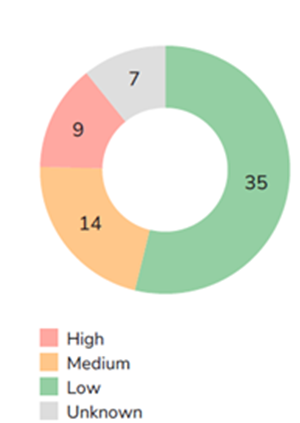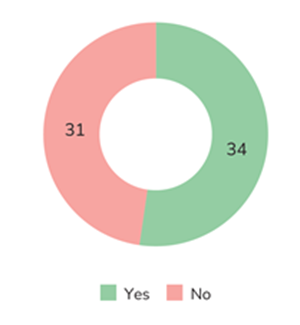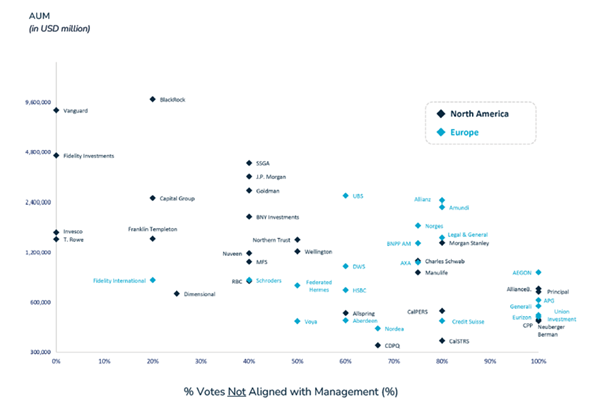|
Editor’s Note:
Ali Saribas is
a Partner at AQTION. This post is based on his AQTION study. |
AQTION, leveraging its proprietary database powered by SquareWell
Partners, published its second review on how the world’s largest 65
investors (hereafter referred to as the “Top 65”) are evaluating
governance and sustainability issues and stewarding their portfolios.
Together these investors (including some of the largest Assets
Managers, Sovereign Wealth Funds, and Pension Funds) have nearly
USD 91 trillion in Assets Under Management (AUM). See a summary
post of the findings from last year’s study.
In this year’s analysis of the Top 65, the composition of the universe
remains almost identical with the previous year, with only one change:
Voya Investment Management (Asset Manager, US) replacing Baillie
Gifford (Asset Manager, UK). To maintain comparability, the study
retained the same factors used in the previous year’s assessment,
while also incorporating new factors designed to capture investor
sentiment on emerging topics of interest, such as artificial
intelligence.
Notably, this year’s analysis looked athow these influential
investors voted on high-profile situations. This includes, for
example, the 2024 board contest at Walt Disney and the controversial
approval of Elon Musk’s multi-billion dollar pay package at Tesla.
These real-world examples offer valuable context to understand how the
Top 65 investors are exercising their influence on critical corporate
governance matters.
The full report is available here.
Below, we highlight some of the key takeaways from AQTION’s review of
the stewardship activities of the Top 65 investors, with selected
points explored in greater depth.
i. Stewardship Teams
Implementation of structures necessary for stewardship activities –
such as the introduction of a stewardship team, or publication of a
voting policy – are mature in their development.
Regulatory turbulence, especially SEC’s revised guidance for a more
stringent approach to monitoring investor activities that could
influence corporate control, may lead investors to carefully evaluate
their engagement strategies with portfolio companies and be less
transparent in engagements, leaving companies to rely more heavily
on their public positions and voting behavior to understand their
position.
ii. Pass-Through Voting
As Pass-Through Voting proliferates among index investors, such
as BlackRock and Vanguard, active managers remain reluctant to adopt,
indicating that voting is more strongly regarded as necessary for
active fund management.
iii. Voting Guidelines
Only 18 investors have published one or several regional policies,
indicating that stewardship is generally configured to apply global
principles. Notably, State Street Global Advisors consolidated
several policies into one global position in 2024.
Investors’ voting guidelines published in 2025 have also generally
become less prescriptive and more principles-based compared to
previous iterations. Notably, several investors have scaled back their
focus on Diversity, Equity & Inclusion (DEI) issues in response to
recent political backlash, particularly in the U.S. However, no
similar shift has been observed regarding climate-related
expectations, which remain an important issue for investors.
iv. Proxy Advisors
Proxy Advisors continue to be influential on investor vote decision
making, but are not commonly relied on heavily. ISS continues to be
the clear leader in supplying research, however, Schroders
switched to Glass Lewis as their primary proxy advisor in the year.
While many investors seek recommendations from Proxy Advisors, most
of the Top 65 investors have developed their own internal voting
guidelines. To this end, AQTION notes that only 9 of these
investors exhibit a “High” reliance on their chosen Proxy Advisor’s
recommendations, whereas 35 investors show a “Low” reliance (see
Graph 1). As highlighted by ISS’s latest Best
Practices Principle Statement, approximately 91% of the
total voted shares processed by ISS on behalf of their clients are
linked to clients’ custom voting policies. This means that
rather than relying on ISS’s standard research recommendations,
investors have ISS apply their own voting guidelines when determining
how to vote at general meetings.
Graph 1 – Investors’ Reliance on Proxy Advisor Recommendations
v. Stewardship Transparency – Votes and Rationales
Investor Voting Behavior and Rationale: 56 of the Top 65 investors
disclose their voting records, with close to half providing vote
rationales (see Graph 2). A
few, such as CalPERS and Norges Bank Investment Management (“NBIM”),
go further by pre-declaring their voting intentions, while others like
Legal & General Investment Management (“LGIM”) and Neuberger Berman do
so only for high-profile or contentious votes.
Graph 2 – Investors’ Vote and Rationale Disclosure Practices
vi. Investor Communication on Key Topics
Despite ongoing pushback against elements of the ESG ecosystem in
2024—including the withdrawal of several prominent investors from
Climate Action 100+ and the suspension of the Net Zero Asset Managers
Initiative in January 2025, investors continue to communicate their
expectations on a broad spectrum of topics ranging from executive
pay to biodiversity.
vi.a. One-Off Awards
Investors generally have reservations about awards granted outside
of the standard pay package (“One-Off Awards”), considering these
awards often reward executives for actions widely considered to be
within the scope of their responsibilities. AQTION finds that 34
out of the Top 65 investors provide insight into this topic (see Graph
3). While 8 investors, such as J.P. Morgan Asset Management
(“JPMAM”) and Aberdeen Investments are against one-off awards as a
matter of principle, other investors (26 of the Top 65) may support
special awards outside of Remuneration Policy where the company can
demonstrate truly exceptional circumstances and/or significant
additional value creation.
Graph 3 – Investors That Have Guidelines on One-Off Awards
vi.b. Artificial Intelligence
As Artificial Intelligence (“AI”) rapidly transforms industries
and business models, investor scrutiny on its ethical use, governance,
and long-term impact has intensified. AQTION finds that 26 of the
Top 65 investors have published dedicated position papers on AI,
outlining their expectations for how companies should responsibly
integrate AI into their operations. These papers emphasis the need
for clear governance frameworks, transparency in AI development and
deployment, and an understanding of the societal and ethical risks
involved. Investors are urging companies to demonstrate
accountability, ensure fairness, and safeguard against potential
negative consequences as AI becomes a more integral part of business
strategies.
vii. Shareholder Activism
Shareholder Activism:
Activism is now a core component of voting guidelines, with 39 of
the Top 65 investors incorporating criteria for evaluating activism
situations. This marks a broader shift toward proactive
stewardship, as traditional investors increasingly use public
channels—such as press releases and media statements—to hold companies
accountable. Notably, 29 investors have recently disclosed concerns
about portfolio company performance or governance in case studies and
stewardship reports. In 2024 and early 2025, Neuberger Berman
exemplified this trend by publishing detailed voting rationales for
high-profile activism cases, including Walt Disney (US), Keisei
Electric Railway (JP), UGI Corporation (US), and Rio Tinto (UK, as
well as for uncontested votes.
viii. Investors’ Voting Scorecard
AQTION’s analysis of the Top 65 investors voting behavior suggests
that European asset managers appear more comfortable challenging
management through their votes, while U.S. investors show a marked
hesitance to do so (see Graph 4). This divergence is particularly
evident in high-profile cases involving companies such as Boeing,
Apple, ExxonMobil, and Walt Disney.
Graph 4 – Investor Voting Patterns in High-Profile Shareholder
Meetings
|
Harvard Law School Forum on
Corporate Governance
All copyright and trademarks in
content on this site are owned by their respective owners. Other
content © 2025 The President and Fellows of Harvard College.
Privacy
Policy |




